
2020 Excellence Awards Finalists
Congratulations to the Finalists in the Engagement Australia 2020 Excellence Awards.
These Awards identify and celebrate the most exciting engagement activities undertaken by universities that demonstrate far-reaching impact and innovation in the Australian and New Zealand economy and community.
In its first year of transition from the BHERT Awards we are pleased to advise that it has been one of the busiest years for Award submissions, with 124 submissions from 35 universities across Australia and New Zealand.
The Awards Judging Panel have commented on the exceptional quality of the submissions received this year.
Join us at the online event to celebrate the Awards winners on Tuesday 1st December 6-8pm (AEDT) and register for this complimentary event.
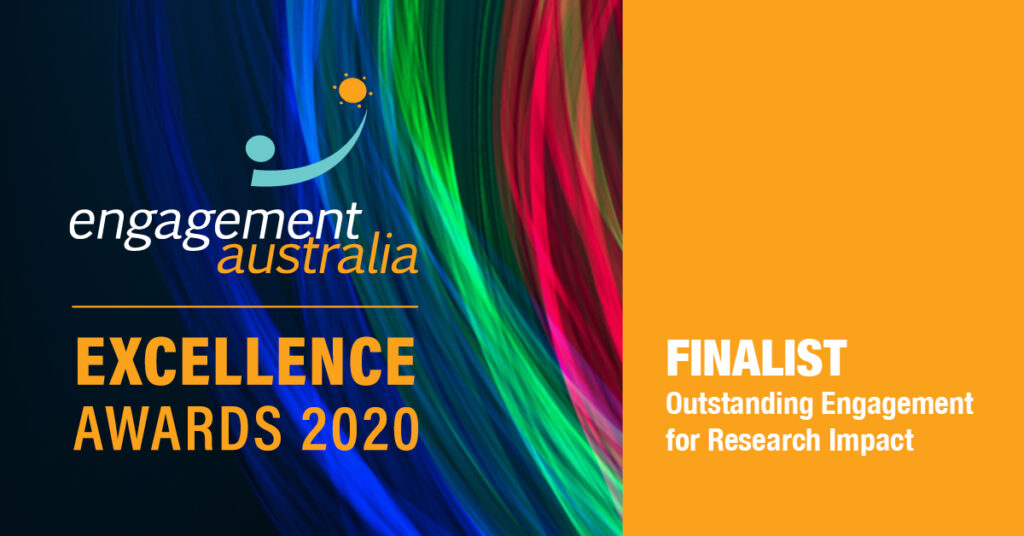
NSW COVID-19 Mapping Tool, University of Sydney
In close consultation with NSW Health and industry stakeholders, the University of Sydney launched the NSW COVID-19 Mapping Tool to provide the most geographically detailed map of the outbreak that was publicly available, allowing state and federal government stakeholders, Australian media, industry groups, and members of the general public to identify outbreaks in their immediate area; socio-economically disadvantaged and vulnerable communities to allow for the prioritisation of resources to inform the public health response and recovery.
Novel Pest Management Program, Charles Sturt University
Led by Professor Geoff Gurr, a Charles Sturt University research team, in collaboration with various Australian and international partners have spent the last 22 years researching how to achieve food security whilst reducing reducing dependence on non-renewable, environmentally hazardous inputs through the development of innovative solutions including a pest suppression method leading to policy changes, which in China alone resulted in benefits estimating US $28 million and the development of various multi-lanugage, multi-format communications including a 20-episode TV series broadcast nationally in Vietnam to maximise delivery and ultimate impact.
Professionalising Fire Safety Engineering, University of Queensland
Initiated by a team from the University of Queensland, members of the board of the Warren Centre for advanced engineering at the University of Sydney and two Principals at ARUP consultants, the Warren Centre Project: “Professionalising Fire Safety Engineering” was started in response to the Lacrosse fire in Melbourne and reports of deep-rooted problems related to Fire Safety Engineering in the building sector, uniquely representing the input and interests of a broad cross section of the Fire Safety Engineering community in Australia, including regulators, professional bodies, industrial bodies and consultancies, by raising the capabilities of the community of professionals for the design, construction, and ongoing maintenance of complex buildings for the purpose of improving public safety.
PainChek®, Curtin University
In 2012, Curtin University researchers, PhD candidate Mustafa Atee with co-supervisors Prof Jeff Hughes, and A/Prof Kreshnik Hoti, began investigating how patients with advanced dementia could verbalise pain, leading to the design of a new multidimensional pain assessment tool, PainChek, to improve the detection of pain in people with dementia through the use of artificial intelligence to detect pain-related facial micro-expressions and smart automation for the collection of non-facial pain related cues, which has now been rolled out to more than 150 consultants across Australia.
Machine Learning for better data-driven decisions in the operation of Australia’s national electricity grid, University of Melbourne
Dr Fateme Fahiman’s PhD studies made important breakthroughs in using machine learning to forecast electricity demand on days with extreme load and to measure the reliability of the grid to ensure sufficient reserve generation capacity is available, which has resulted in a collaboration between the University of Melbourne and the Australian Energy Market Operator (AEMO) successfully developing an approach that forecasts demand in the national electricity grid, reducing the risk of disruptions of elecrity supply in a cost-effective manner.
Using marketing to improve the lives of Australia’s most vulnerable people - University of Wollongong
For 13 years, this multidisciplinary partnership between the University of Wollongong, the University of Queensland, CatholicCare Wollongong, CareSouth, William Campbell Foundation and the NSW Department of Communities and Justice has used high quality, multidisciplinary research to identify marketing strategies to effectively attract people with the characteristic to become good foster carers and to assist non-profit organisations to compete more effectively with commercial providers under the NDIS, which has not only added to scientific knowledge, but also provides practical tools to improve the delivery of social services that improve the lives of some of Australia’s most vulnerable people.
Development of natural technologies based on the use of naturally occurring microorganisms for the removal of contaminants from the environmen - RMIT
With more than 30 years developing natural technologies in bioremediation Professor Andrew Ball has invited industry partners to access large scale sites and equipment through the provision by RMIT University of an accredited quarantine facility within the Environmental Biotechnology laboratory resulting in generating over $13 M worth of external research income; significant new knowledge to the discipline, evidenced by 152 papers in the field of bioremediation in international peer-reviewed journals; 12 bioremediation projects in collaboration with industry in 5 years and several studies indicating the developed technology has resulted in the commercial scale (250 tonnes) degradation of hydrocarbons on soil and groundwater.
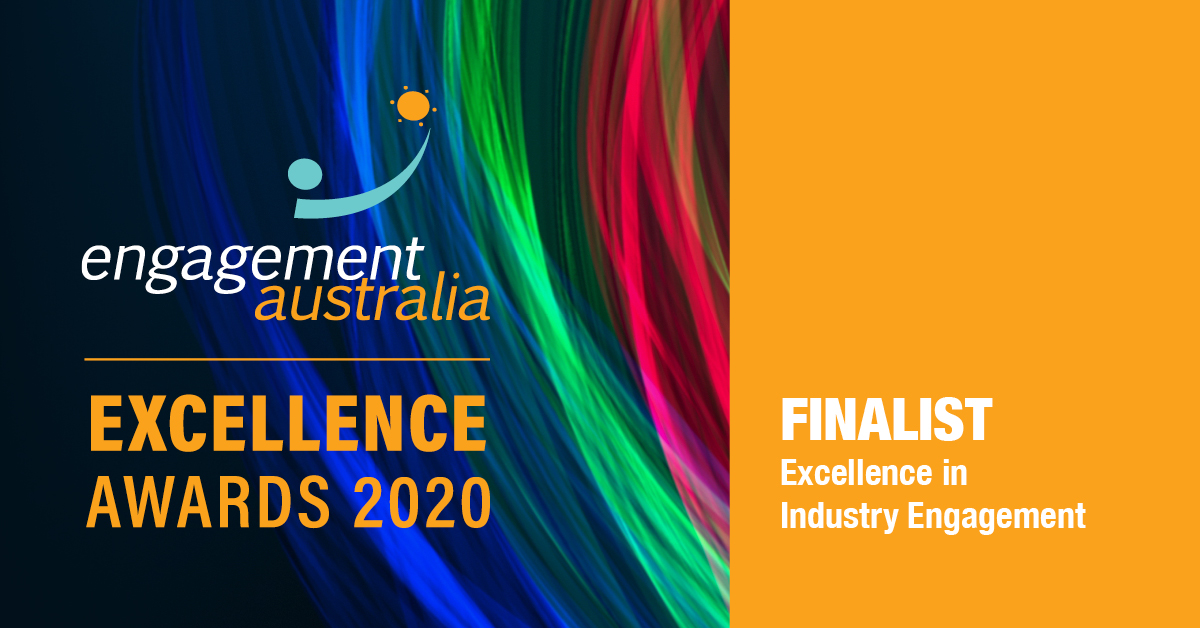
Collaboratively Supporting Placements Through a Pandemic, University of Newcastle
The University of Newcastle (Newcastle) and QSR International (vendor of SONIA, the Work Integrated Learning (WIL) management platform) developed the SONIA Community for the purpose of encouraging conversations around placement management, facilitating cross-institutional connectivity by encouraging staff to share expertise, work collaboratively to develop solutions supporting best practice and student engagement; and in response to COVID-19, allowing Newcastle to share their industry-leading processes and resources for managing student placements to help support the sector to manage and recover from the pandemic by ensuring students can attend placements in safe, supported environments.
CrowdCARE Program, University of Melbourne
Identifying a major gap in methods to teach research critical appraisal, in 2016, A/Prof Laura Downie and A/Prof Michael Pianta from the University of Melbourne conceived CrowdCARE, a new pedagogical approach that teaches skills fundamental to evidence-based practice using a dynamic, crowdsourced platform, which is now accessible to a global pool of >5,000 people committed to improving healthcare.
Bachelor of Youth Work, Victoria University
Since 2017 the Youth Work team at Victoria University has worked actively with Youth Action, the peak body for young people and youth services in NSW, who represent 1.4 million young people and the services that support them, to deliver an opportunity for Youth Workers to upgrade from their Diploma of Youth Work or Community Services to a Bachelor of Youth Work, resulting in Youth Workers who had experienced blocks to career pathways into leadership the opportunity to strengthen their practice from recent industry knowledge and research and their ability to hold more senior roles by strengthening their link to theory and research.
RMIT Industry Training Nursing Model
Wanting to develop an innovative, transformative and sustainable Enrolled Nurse (EN) program, RMIT partnered with Northern Health to deliver a program utilising a blended approach of face to face, online, self-paced learning and clinical placements, resulting in less time spent in a classroom environment with students studying through applied learning with a hands-on approach, enabling graduates to transition into employment.
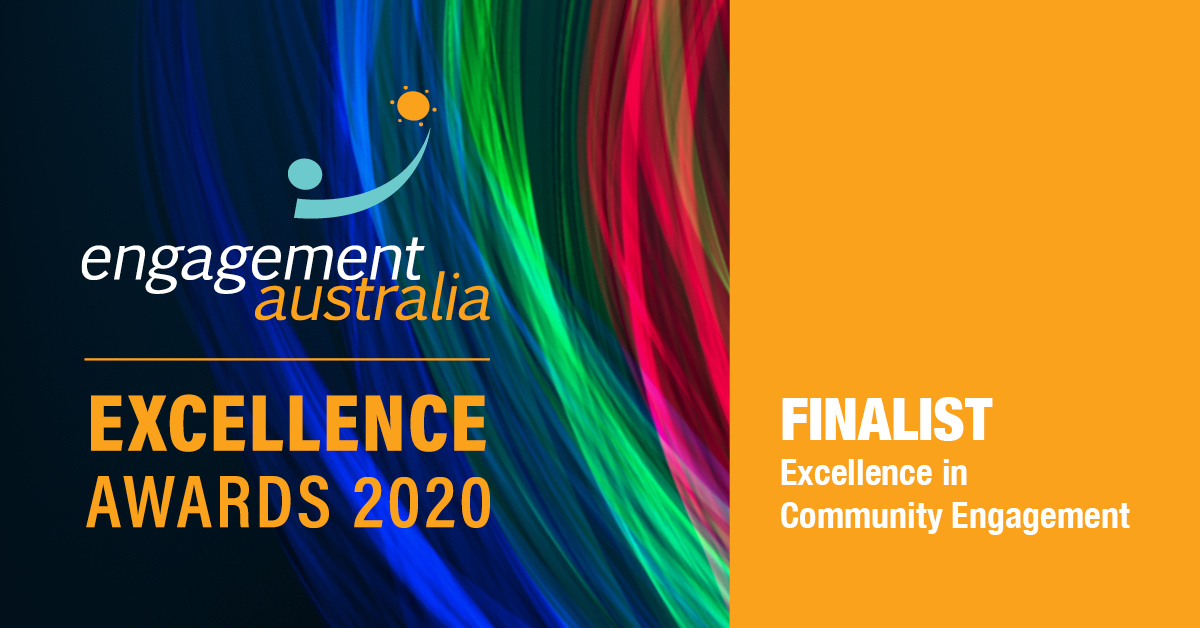
Environmental Long-Term Intervention Monitoring and Monitoring, Evaluation and Research Programs, Charles Sturt University
Led by Professor Robyn Watts and Associate Professor Skye Wassens, the Charles Sturt University Long-Term Intervention Monitoring program (LTIM; 2014-2019) and the Monitoring, Evaluation and Research program (MER; 2019-2022) is a unique community engagement initiative engaging government management agencies, landholders and Indigenous and non-Indigenous community groups in research and monitoring programs used to inform national and state water policy decisions, which has resulted in generating new knowledge to underpin environmental water management interventions aimed to maintain and improve water quality, ecosystem processes, aquatic vegetation, and fish, frog and water bird populations.
Pain Revolution Program, University of South Australia
Established in response to the significant social inequity regional and rural communities experienced to access best treatments for the management of persistent and chronic pain, Pain Revolution is a large collaboration of researchers, clinicians, people with lived experience, peak bodies and industry partners, who share the vision that all Australians have access to the knowledge, skills and local support to prevent and overcome persistent pain, by building capacity to provide ongoing community education and local support to overcome persistent pain.
The ‘Daughters and Dads Active and Empowered’ Program, University of Newcastle
Developed by Professor Phil Morgan, colleagues from the University of Newcastle and the Hunter Medical Research Institute, the Daughters and Dads Active and Empowered community-based, multi-award-winning education program targets fathers/father-figures to improve their daughters’ physical activity levels and social-emotional well-being, resulting in $4.1 million in research funding; delivery in six schools, five Sport and Recreation Centres across NSW and six community settings in the UK to a total of 678 daughters, 790 fathers and training of >185 facilitators across NSW and England.
Wunungu Awara (A Strong and Healthy Country), Monash University
Working on the premise Indigenous communities already know how to support intergenerational knowledge sharing and learning, Wunungu Awara’s strength is its emphasis on how best to construct a living archive that is a decolonised space; a collaborative, co-creative journey between the partners – Indigenous, non-Indigenous, community, and academics which ensures Indigenous communities’ rights in the protection of their cultural and intellectual property and creates a relationship where communities are comfortable to see their material stored within a 3D animated form, whilst providing an exciting place for scholars to work and share knowledge.
Yarning Up - Bond University
Developed by Bond University and the Lockhart River Aboriginal Shire Council, Yarning Up provides school principals, corporate CEOs, entrepreneurs and philantrhopists with a culture and corporate immersion program in the Lockhart River and the Torres Strait Islands aimed at facilitiating a deeper and more personal understanding of Indigenous culture through a first-hand connection with the community.
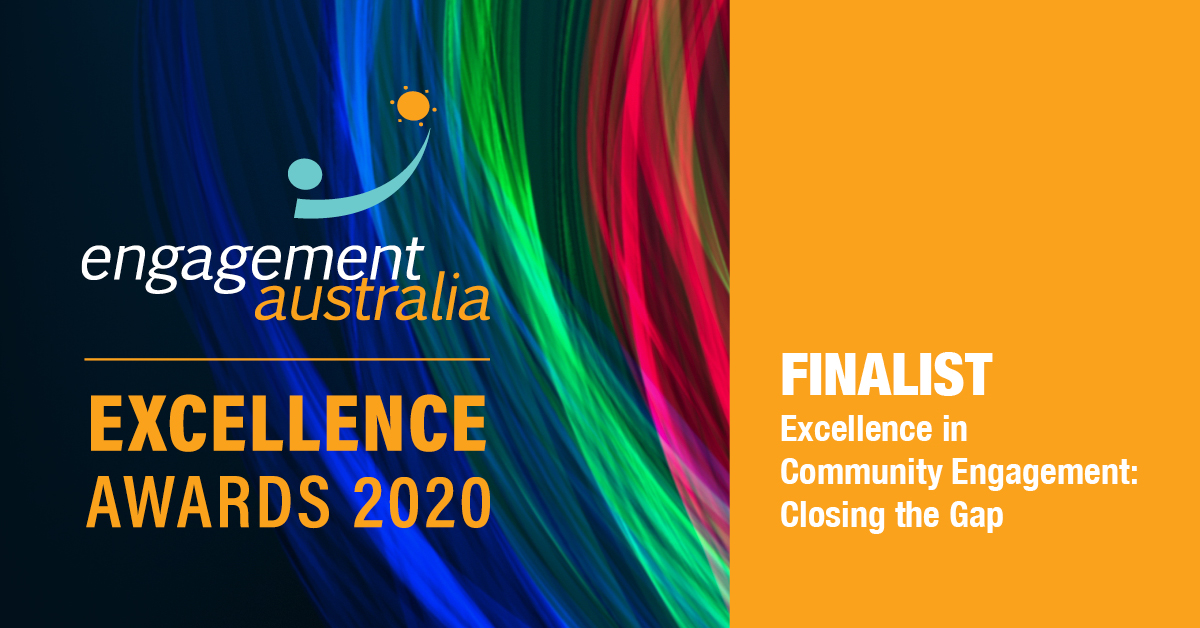
The Djirruwang Aboriginal Mental Health Worker Education and Training Program, Charles Sturt University
First developed in 1993, the Djirruwang Aboriginal Mental Health Worker Education and Training Program was developed and refined by clinicians, Indigenous communities, NSW Health and Charles Sturt University working in close partnership and reciprocal learning to train a specialised workforce to address Indigenous over-representation of people with depression, psychotic disorders and high suicide rates by providing Indigenous peoples with high quality knowledge, skills and attitudes in the field of mental health, building on cultural understanding, combining mental health theory with clinical practice and providing the opportunity for participants to gain degree level qualifications in mental health with Charles Sturt University.
Cherbourg-QUT Partnership Project, Queensland University of Technology
Deliberately founded on principles of decolonisation and reciprocity, the Queensland University of Technology and the people of Aboriginal community Cherbourg have developed a Work Integrated Learning (WIL) placement for QUT students from diverse disciplines to work on projects selected by the community for the benefit of the community, including establishing a youth council, providing bespoke first aid training for the community and documenting stories of wisdom from community Elders to be placed in the Cherbourg Indigenous Knowledges Centre.
Wunggurrwil Dhurrung Centre – Closing the Gap for Aboriginal community in Wyndham and the West of Melbourne, Victoria University
The design and building of the Wunggurrwil Dhurrung (Strong Heart – Wadawurrung) Centre, in collaboration with the Indigenous community, Wyndham City Council, Victorian State Government and Moondani Balluk at Victoria University (VU), provides Aboriginal peoples in Melbourne’s West with a gathering place which includes an early year’s space, Koling wada-ngal (Walk together – Wadawurrung) space specifically for Indigenous peoples and local cultural strengthening programs for Indigenous people to grow, connect and share cultural practices with each other.
Poche Oral Health Program, University of Sydney
In partnership with the Centre for Oral Health Strategy in the NSW Ministry of Health and the local Aboriginal Medical Services, the Poche Centre was approached to develop a comprehensive, affordable and effective service to address the very significant oral health issues in rural and remote Aboriginal communities in the Central Tablelands region, resulting in the delivery of comprehensive oral health services across eight communities in collaboration with two Aboriginal Health Services, two Local Health Districts, five community health services, 18 schools and six pre-schools; the development of dental assisting scholarship program to accompany oral health services, dental assisting and oral health promotion, which has increased workforce in the Central Tablelands area and state-wide.
Macquarie-Yaegl Partnership, Macquarie University
The Macquarie-Yaegl partnership facilitates the recognition and preservation of Yaegl Country customary knowledge, and through its education branch, the National Indigenous Science Education Program, promotes educational attainment and STEM engagement in Indigenous youth by empowering them to become leaders of science events, working alongside Yaegl Elders, Macquarie scientists and other STEM providers, and role models for other Indigenous youth.
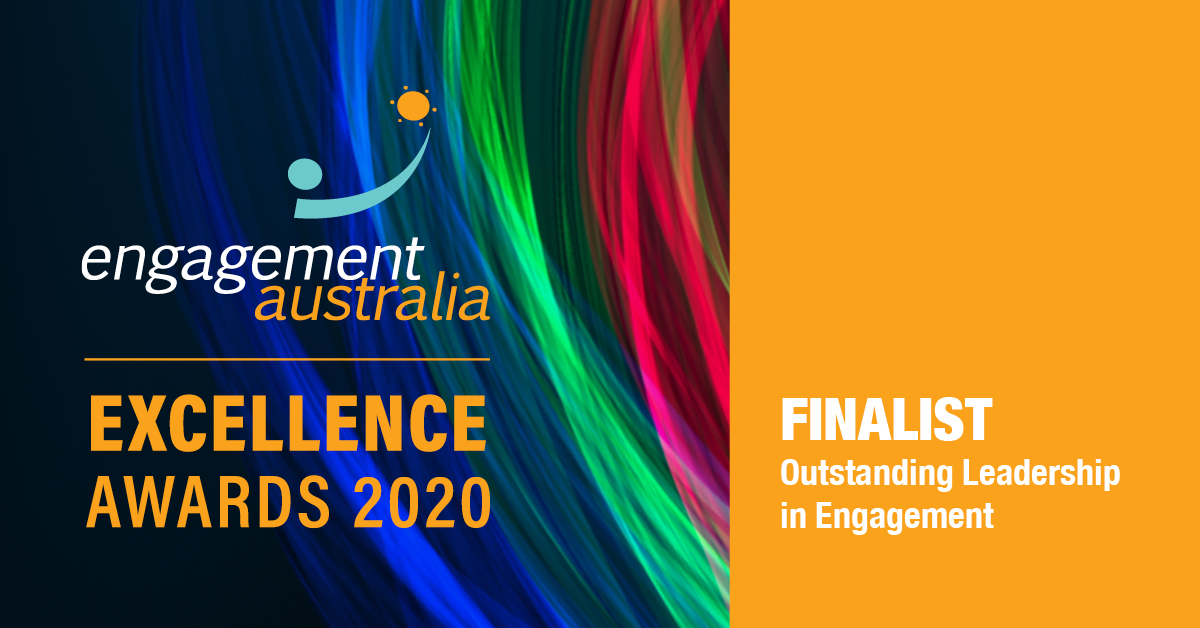
Karen Jackson, Victoria University
Karen Jackson is a Yorta Yorta woman with more than 20 years creating culturally safe spaces to enable Aboriginal people to aspire to personal, family and community goals by engaging with Aboriginal community members and service providers in the west of Melbourne, resulting in sustained and impactful partnerships between Victoria University and community which has included her instrumental role in designing VU’s Bathelmun Yalingwa (‘Shine Bright’) Strategy and developing the Vice-Chancellor’s Indigenous Leadership Committee to grow the numbers of Aboriginal and Torres Strait Islander peoples engaging with the University, share knowledge and connect the physical environment to Aboriginal spaces and to Melbourne’s west to help transform lives.
Danielle Godbier, University of Sydney
Industry and Community Project Units (ICPUs), led by Danielle Godbier is an ambitious large-scale undergraduate program at the University of Sydney which sees students engage and collaborate with over 60 different industry partners from six global markets to develop out of the box, innovative solutions to real world problems, with projects including the impact of artificial intelligence on the banking sector, democratising healthcare through technology and how can the airline industry minimise disruption to its customers with partners such as Westpac, Accenture and Qantas.
Dr Anita Smith, La Trobe University
Dr Anita Smith is a leader in community engagement for heritage protection and management in the Pacific Islands and Australia by supporting community conservation objectives by building capacity for heritage protection and conservation, at the same time increasing the representation of Indigenous heritage values on the World Heritage List, including the first World Heritage sites from the Federated States of Micronesia, Fiji, and French Polynesia.
Professor Roger Stone, University of Southern Queensland
With 35 years experience conducting and coordinating dedicated research into climate systems and its impact on agriculture and disaster risk management Professor Roger Stone has made it a priority to link his climate science research to real-world practice and engagement resulting in excess of $50,000,000 research income; a major $9,000,000 funded project through Meat & Livestock Australia (MLA), The Queensland Government and the University of Southern Queensland (USQ) and training local community members with a strong record of local engagement in practical climate science so they can work with businesses and their community in management decisions.
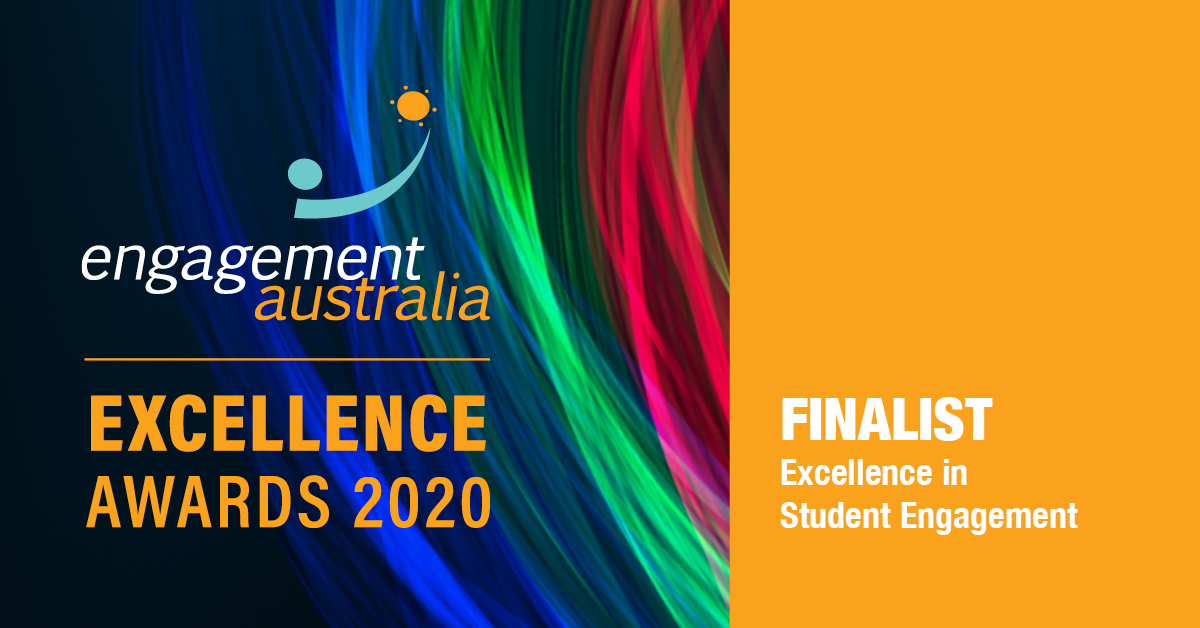
BioDesign Innovation Melbourne, University of Melbourne
BioDesign Innovation Melbourne is a joint teaching program offered since 2016 at the University of Melbourne by Melbourne School of Engineering (MSE) and Melbourne Business School (MBS) focused on nurturing high-quality founders solving ambitious problems and forming start-ups with valuable intellectual property and sound business models to seed start-ups, resulting in 10 companies formed from 18 teams between 2016-2019.
IBM - Federation University Australia Collaboration, Federation University Australia
IBM and Federation University wanted to create a deep and strategic collaboration to create the new generation of IT professionals to maximise educational impact and deliver a guaranteed pipeline of aligned skills, resulting in the development of a Technology Park which generates an estimated $300 million annually, employs 2100-plus and hosts 64 businesses; establishing a Bachelor of IT (Profession Practice) which enables students to spend 1600 hours across their degree in salaried work at IBM embedded in real projects and teams and the employment of 300 graduates and alumni at IBM.
Inside Out Prison Exchange Program, RMIT University
Since 2015, Dr Marietta Martinovic, Senior Lecturer Criminology and Justice (CJ) Studies at RMIT University (RMIT), in partnership with Corrections Victoria (CV) and several Victorian prisons, has led the development and delivery of the Inside Out Prison Exchange Program (IOPEP), a transformative education program for prisoners and incarcerated people, to provide future criminology and justice professionals with intimate knowledge and understanding of the individuals they will represent, as well as the often complex circumstances of their incarceration; and secondly, to prepare incarcerated people for a pro-social life upon release; which has resulted in breaking down barriers and boosting understanding between the two student groups, the criminal justice system and enhancing outcomes for the prisoners when they return to life outside.
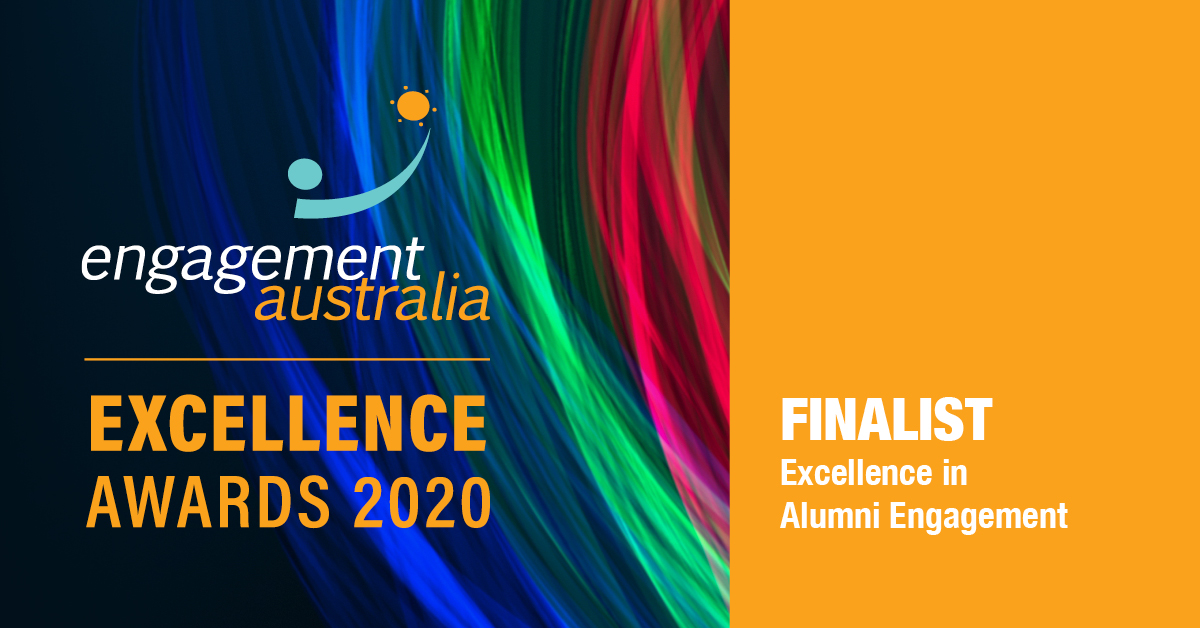
Global Discovery Program Study Tour, Monash University
The Monash Global Leaders Network is an active group of committed Monash University alumni living and working in countries with a significant alumni presence who build and support the Global Leaders’ Network in its country, attract philanthropic support and enhance the student experience with initiatives including a Global Discovery Program Study Tour which enables students to vist and meet with New York City-based alumni and their organisations; better understand the range of careers available to them and allows student and alumni to build partnerships, resulting in a deep and purposeful commitment to global alumni engagement.
Thoughtful engagement begets investment, University of Sydney
The challenges of COVID-19 prompted Sydney University to an innovative and meaningful of connecting Alumni with the University and students. The engagement model prioritised digital platforms and individual connection focusing on engaging specific cohorts of alumni through inspiring storytelling and connecting them to the University in ways that are personally meaningful. The suite of programs demonstrates how thoughtful engagement begets investment: Supporting students through alumni mentoring; Webinars to foster alumni and industry engagement; messages of thanks to the 50,000 alumni at the Covid frontline; Zoom reunions to reconnect small and dispersed cohorts; Alumni care calls with 345 isolated and elderly alumni; and meaningful conversations about leaving a legacy, amounting to more than $19 million in student bursaries and Bequests.
